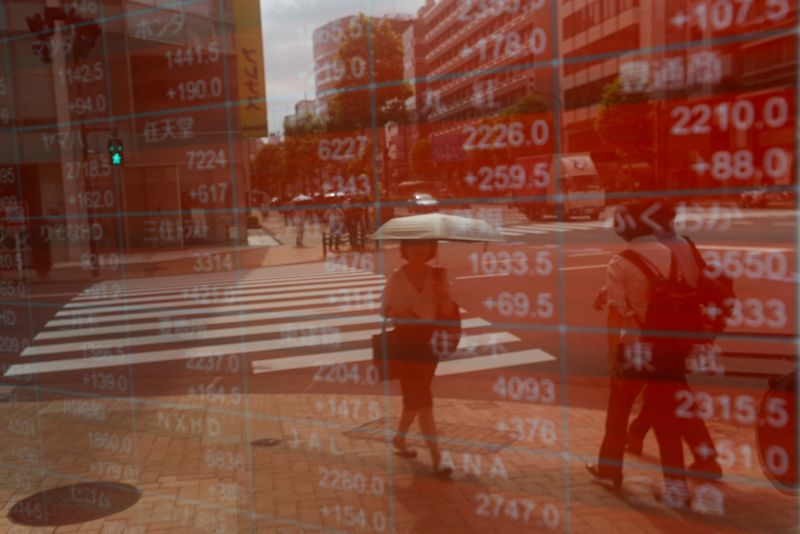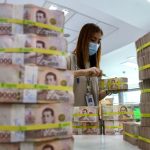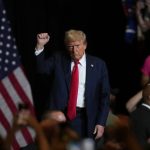
By Harry Robertson and Naomi Rovnick
LONDON (Reuters) – Investors globally are piling into the U.S. dollar and betting on rising volatility ahead of a crucial two weeks in which the United States and Japan elect leaders, three major central banks decide on interest rates and the new UK government presents its budget.
The U.S. currency hit a three-month high this week in response to a strong U.S. economy and potential win for Republican former president Donald Trump in the Nov. 5 election.
Meanwhile, gauges derived from financial contracts called options, which are used to hedge against swings in the market, show investors are anticipating a jump in currency and bond volatility over the next month.
Still, stocks have remained broadly calm on strong U.S. data and earnings, though the VIX index of expected equity market swings sits above its 2024 average, signaling possible turbulence ahead.
“We’re going to have quite an incredible, volatile two weeks,” said Ales Koutny, head of international rates at Vanguard, who said he had sold some assets in favour of cash.
“We’re going to start getting some increased vol, and that’s only going to settle down the week after the (U.S.) election.”
TRUMP TRADES
Trump is neck and neck with Democrat Vice President Kamala Harris in the polls. Yet investors are taking their cues from betting markets, where the odds have shifted in Trump’s favour.
The dollar has rallied more than 3% so far in October as bond yields have climbed towards three-month highs, partly because markets are preparing for potentially higher U.S. tariffs flagged by Trump if he wins that could push up inflation and force the Federal Reserve to keep rates higher.
Trade worries have helped drive a gauge of expected volatility in the euro over the next month to its highest in 18 months.
“We’ve shifted the portfolio defensively,” said James Athey, fixed income portfolio manager at Marlborough, adding that he expects the dollar to rise further and has reduced his exposure to U.S. government debt in favour of German bonds.
Investors wary of inflation and populism are rushing into gold, Bank of America said on Friday, while Citi data showed hedge funds were piling into the dollar.
Markets might be underestimating risks posed by geopolitics and impending elections, the International Monetary Fund warned this week.
US JUGGERNAUT
The bigger driver for the dollar, however, has been relentless U.S. economic strength. Stronger-than-expected jobs data, retail sales numbers and jobless claims figures have caused investors to dial back Federal Reserve rate cut bets.
The Nov. 1 jobs data for October could be a flashpoint – feeding into the Fed’s rate decision six days later, where traders now expect a 25-basis-point rate cut, having previously seen a strong chance of a second 50-bps reduction.
Bond yields have bounced around as traders struggle to judge the Fed, pushing a measure of expected volatility in the $27 trillion Treasury market to 10-month peaks.
And the CBOE Skew index, measuring demand for financial contracts called options that pay out when stocks suffer big falls, is near levels that usually signal anxiety.
Overall stocks have remained comparatively placid, with the S&P 500 index down a modest 0.9% this week.
Strong earnings from the likes of Tesla (NASDAQ:TSLA) have kept the equity market calm, Janus Henderson multi-asset manager Oliver Blackbourn said, as well as robust U.S. data.
Artemis fixed income manager Liam O’Donnell said he had bought five-year Treasuries in the last two days and thought markets were exaggerating how high U.S. rates would stay were Trump to win. POLLS, POLICY
Britain’s Labour government meanwhile presents its first budget on Wednesday after winning power in July, before the Bank of England ‘s interest rate decision on Nov. 7.
Memories of a bond market rout after Prime Minister Liz Truss’s disastrous budget in 2022 hang over the event.
British government bond yields rose sharply on Thursday after finance minister Rachel Reeves said she would change the fiscal rules to allow her to borrow more to invest.
Allianz (ETR:ALVG) Global Investors, PIMCO, abrdn and Artemis say they are keen on gilts, betting yields have risen too far.
“We have recently initiated a long duration position in gilts,” said Linda Raggi, senior investment manager for fixed income at Pictet Asset Management. “We believe the budget will be focusing on supporting growth (and) think gilts have room to outperform once the event risk passes.”
Japan’s politics and central bank also loom large, after a rate hike and yen surge helped spark market chaos around the world in August.
Japan’s ruling Liberal Democratic Party may lose its majority in Sunday’s snap election and potentially form a coalition with opposition parties who back monetary stimulus.
The Bank of Japan is expected to hold rates steady on Oct. 31 and traders will watch for hints on the outlook that could shift the yen, which has slumped more than 8% since mid-September.






